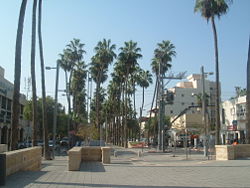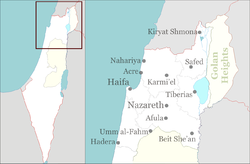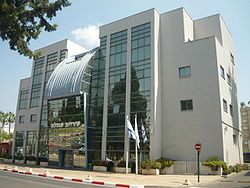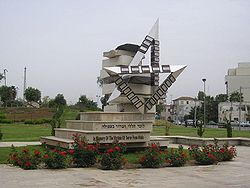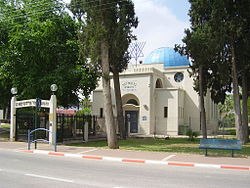- Afula
-
Afula Hebrew transcription(s) - Hebrew עֲפוּלָה - ISO 259 ʕapula Arabic transcription(s) - Arabic العفولة Arlosoroff Boulevard 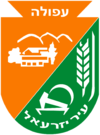
Municipal seal of AfulaCoordinates: 32°36′22.56″N 35°17′17.11″E / 32.6062667°N 35.2880861°ECoordinates: 32°36′22.56″N 35°17′17.11″E / 32.6062667°N 35.2880861°E District North Founded 1925 Government - Type City - Mayor Avraham Elkabetz Area - Total 26,909 dunams (26.9 km2 / 10.4 sq mi) Population (2009)[1] - Total 40,500 Afula (Hebrew: עֲפוּלָה; Arabic: العفولة, al-ʻAfūlaḧ) is a city in the North District of Israel, often known as the "Capital of the Valley", referring to the Jezreel Valley. The city had a population of 40,500 at the end of 2009.[1]
Contents
History
Located in the Jezreel Valley, Afula is roughly halfway between Jenin and Nazareth. It lies on the site of the Israelite village of Ofel, the hometown of the Biblical figure Gideon. It is mentioned in the Books of Kings (2 Kings 5, 24) in connection with Elisha and the disciple of Elijah, who lived in the vicinity.
The 12th-century sultan Saladin founded an Arab village named al-Fulah on the site. In 1226, Syrian geographer Yaqut al-Hamawi mentioned it as being "a town in Jund Filastin," and formerly a Crusader castle between Zir'in and Nazareth.[2] In 1799, during Napoleon's Syrian campaign, the Battle of Mount Tabor was fought around al-Fulah.
In 1909 or 1910, Yehoshua Hankin completed his first major purchase in the Jezreel Valley. He bought some 10,000 dunams (10 km²) of land in Al-Fuleh (now Afula), which became the home of Merhavia and Tel Adashim. This purchase also marked the start of bitter disputes between Arabs and Jews over the rights of tenant farmers who had been evicted, and regarding the employment of Jewish or Arab watchmen for the land.
The modern community of Afula was founded in 1925 by the American Zionist Commonwealth, after the completion of the purchase of the valley from the Sursuk family of Beirut. The nearby Arab village of Al-Fulah was disbanded by the turn of the century. At the time, the community was served by the Jezreel Valley railroad, which was abandoned during the War of Independence.
Demographics
According to provisional data by the Israel Central Bureau of Statistics (CBS), by the end of 2009 the city had a total population of 40,500.[1] In 2001 the ethnic makeup of the city was 99.4% Jewish and other non-Arabs, without significant Arab population whilst there were 262 immigrants. There were 18,500 males and 19,900 females. The population of the city was spread out with 34.3% 19 years of age or younger, 15.8% between 20 and 29, 17.5% between 30 and 44, 16.9% from 45 to 59, 4.0% from 60 to 64, and 11.5% 65 years of age or older. The population growth rate in 2001 was 0.9%. See Population groups in Israel.
Economy
According to CBS figures for 2000, there were 13,762 salaried workers and 887 self-employed in Afula. The mean monthly wage for a salaried worker was ILS 4,723, a real change of 6.4% over the course of 2000. Salaried males had a mean monthly wage of ILS 5,913 (a real change of 8.6%) versus ILS 3,541 for women (a real change of 2.0%). The average income for the self-employed was 6,477. 962 people received unemployment benefits and 3,938 received an income guarantee.
Education and culture
According to CBS, there are 24 schools and 8,688 students in the city: 16 elementary schools with a student population of 3,814 and 12 high schools with 4,874 students. 52.3% of 12th grade students were entitled to a matriculation certificate in 2001.
Arab-Israeli conflict
Due to Afula’s proximity to the West Bank, it became a target of Arab terrorism in the Second Intifada. On 6 April 1994, a car bombing carried out by Hamas in the center of Afula killed five people. Afula also was the target of a suicide attack on a bus on 5 May 2002, in which one person died several people were injured at Afula’s central bus station. On 19 May 2003, the city's Amakim Mall was bombed, killing three and wounding 70. This attack was carried out by Palestinian Islamic Jihad and the Fatah movement’s Al-Aqsa Martyrs Brigades. On 17 July 2006, Hezbollah fired Katyusha rockets at Afula, one of the southernmost rocket attacks on Israel from Lebanon. Six people were treated for shock as a result of the bombing. On 28 July, a rocket landed causing a fire. The Katyusha carried 100 kilograms of explosives.
Sports
The city's basketball club, Hapoel Afula, currently play in the Super League.
Notable residents
- Amir Blumenfeld (born 1983), American writer, comedian, actor, and television host
- Yaakov Bodo (born 1931), actor and comedian
- Sarit Hadad (born 1978), singer
- Hila Lulu Linn, painter
- Samuel Scheimann (born 1987), Israeli-Dutch association football player
- Mosh Ben-Ari (born 1970), musician, lyricist and composer.
Twin towns
Afula is Twinned with:
References
- ^ a b c "Table 3 - Population of Localities Numbering Above 2,000 Residents". Israel Central Bureau of Statistics. 2009-12-30. http://www.cbs.gov.il/population/new_2010/table3.pdf. Retrieved 2010-11-22.
- ^ le Strange, Guy (1890), Palestine Under the Moslems: A Description of Syria and the Holy Land from A.D. 650 to 1500, Committee of the Palestine Exploration Fund, p. 441, http://books.google.com/?id=ENANAAAAIAAJ&pg=PA493&dq=Lajjun+Guy+le+Strange
External links
- City website (Hebrew)
- Emek Medical Center
Categories:- North District (Israel)
- Populated places established in 1925
- Jewish villages in the Mandate for Palestine
- Cities in Israel
Wikimedia Foundation. 2010.

